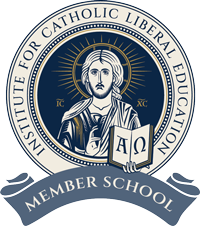One of the staple features of a Saint Theresa Catholic School education is our approach to the study of literature. We honor certain texts as having perennial value for students to read and re-read over the course of their lives, because of the wisdom and insight into human nature that such texts convey. The best works of prose reveal our own hearts to us, whether in the anguished grief of Achilles at the death of Patroklas in The Iliad, the optimistic kindness of Irene in The Princess and the Goblin, or the self-inflicted misfortunes of the self-absorbed Mr. Toad in The Wind in the Willows.
Many literary selections assigned throughout the curriculum serve to round out a student’s appreciation of history, furnishing him or her with the means to peer into the past by reading poetry and prose composed in honor of Charlemagne or as a tribute to the centurions of the Roman Empire. At the same time, however–and more fundamentally–our students are encouraged to consistently take a mental and emotional inventory of what they think it would feel like to live the stories of the main characters in the text. We walk the time-worn and tested literary paths to conduct our students to that point of empathy that will serve as a key to their success in life. A cultivated sense of empathy is one of the great gifts of an STCS education—by these means, students learn in time to write compellingly, because they have connected with a host of individuals in different settings and times.
It is for this reason that we are delighted that we have such an outstanding educational partnership with Ruah Woods, and have implemented their Theology of the Body curriculum at Saint Theresa’s. Like literary studies at STCS, Ruah Woods moves a student from natural to supernatural virtue, urging them to think about life-affirming choices in their daily activities as well as their devotional and sacramental lives. The Ruah Woods curriculum couples the reading of good literature with spiritual reflection on the ways that human beings encounter, through God’s grace, truth, beauty, and goodness in the world around them. Reflection on this encounter of grace in the world inspires gratitude, as we consider how wonderfully God has made us, our world, and our bodies and souls.
This movement from reflection on natural grace to the contemplation of supernatural virtues, is a foundation stone in the pedagogical approach of our faculty. This pattern of engagement with good literature to reflect on grace and our response to God’s call for us to be virtuous, is also at the heart of our PACE program, the guidance curriculum that shapes behavioral norms and social development for students up through 5th Grade at STCS. As often as possible, reading exercises, literature circles, poetry, or story time for the youngest students, starts with a conversation about characters, emotions, and what challenges the lead actors face in the story. That conversation segues directly into the religion lesson of the day, so that students see the connection between character and faith formation. We attempt to live out the insight that Thomas Aquinas captures so well in the Summa Theologica, that grace does not destroy nature, but rather perfects it. The two halves of our motto, fides et ratio—faith and reason—are not in competition or conflict with one another. Rather, both play a key part in our God-given vocation to be the best self we can in this world, as we prepare for “the life of the world to come.”



